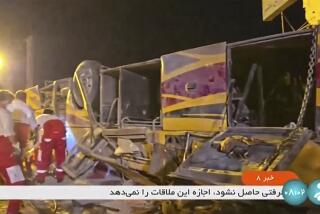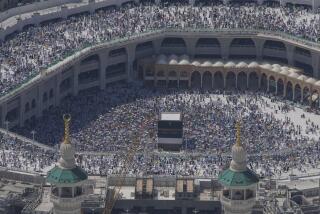Thousands of Iraqis Journey to Mecca
- Share via
BAGHDAD — Khaleel Abbas Ali has made Islam’s holiest pilgrimage three times, and the past week found him at the board of religious affairs here to see if he’d won a lottery for his fourth hajj.
The prosperous 63-year-old Baghdad clothing merchant was not on the list. But he seemed untroubled as hundreds of pilgrims streamed around him, preparing to make the journey that is a requirement of every able-bodied Muslim who can afford it.
“We are living in a country without any law, without any government,” Ali said. “But the people are able to maintain our tradition. This shows the Iraqi people are still mature and civilized.”
Record numbers of Iraqis have applied for a permit this year from Saudi Arabia to make the journey to Mecca, and thousands of the winners crowded onto fleets of buses Thursday that rumbled out of a Baghdad sports stadium to a soundtrack of ecstatic ululations and religious songs.
Tent cities have sprung up in the desert southwest of Baghdad to shelter pilgrims en route, as 30,000 Iraqis join 2 million Muslims from around the world in a ritual that is as old as their religion yet, like so much here, transformed.
In a goodwill gesture, Saudi Arabia has increased the number of Iraqi pilgrims it will allow across its border -- and this time Iraqi secret police will not be along for the ride.
The U.S.-backed Iraqi Governing Council is subsidizing the journey for citizens, including paying full travel costs for hundreds of pilgrims whose families were slaughtered by former President Saddam Hussein’s regime.
“The only thing I will take from my life is this,” said one such participant, an emaciated Khadim Mousa Amad, 73, whose son was killed under the previous regime and who believed he would never make the pilgrimage.
Even as the first buses left Baghdad, no one seemed sure whether they would reach the holy city of Mecca without a hitch -- least of all the newly reconfigured Iraqi religious affairs office.
“It was better arranged before,” fumed Jaafer Ali Abdullah, the office’s assistant director general for the hajj, as he tried to calm a crowd at the Baghdad passport office. “Now it’s just a mess.”
Despite changes in administrative procedures in Iraq, the hajj offers a chance for Iraqis to seize something timeless, even as their society is turned upside-down. “The hajj act has nothing to do with political changes, social changes,” said Mumal Ubaidi, a spokesman for the 14th Ramadan Mosque in Baghdad. “These practices have been done by the Muslims for 1,000 years.”
At the Al Shaab stadium in central Baghdad, Gahtan Mohammed Haidari was still basking Thursday in the memories of his own hajj journey years earlier. The 39-year-old Baghdad chauffeur had just seen his cousin off.
“As soon as he arrives,” Haidari said as he walked toward a police checkpoint and the traffic-choked streets, “he’ll forget everything in his life, all the circumstances here.”
The hajj in its present form dates back to the prophet Muhammad’s own pilgrimage, when he reentered Mecca and gave his last sermon. Muslims from every continent take part in rituals marking important events in the life of Abraham and his family that are supposed to wash away their sins.
In recent decades, members of Hussein’s Sunni Muslim-dominated Baath Party got first crack at Iraq’s 15,000 hajj slots -- those who were out of favor with the regime were shut out. The secret police monitored the pilgrims’ interactions with other Muslims, and some participants complained of shoddy facilities, far from the shrines and sacred wells in the Mecca area that are the centerpiece of the journey.
Now people such as Jassim Mohammed are dreaming of meeting Muslims from other countries and being, as he put it, an “ambassador for our country ... to tell them about the happiness and the bitterness we are living under now.”
A Sunni cleric from Baghdad, Mohammed, 45, had applied for the pilgrimage for 12 years in a row, but was rejected each time. This year he did not believe it when friends told him he was on the publicly posted list of people who had won the lottery to go on the pilgrimage.
His ability to go reinforces his happiness at the new freedoms for Iraq since the fall of the regime, but at the same time he worries about crime and terrorism.
Those worries had faded Thursday for Uqla Bunian, 60, a Shiite Muslim who had eagerly bought the white ritual cloth worn on hajj when he first applied for the pilgrimage in 1980. He was rejected then and felt that it was because Shiites were out of favor in the Hussein era. But he kept the garb, in hopes that a change in government would allow him to make the pilgrimage.
“This is pure happiness,” he said as he stood in the parking lot of Al Shaab stadium, watching other pilgrims hoist their luggage and rolled-up blankets onto buses. “This is the only dream for a Muslim, to go on hajj.”
Banners welcoming the pilgrims festooned the concrete walls around the stadium parking lot. The Iraqi Red Crescent Society had put up 3,000 pilgrims in a tent city behind the stadium; an even larger encampment has been erected at the Saudi border.
But not everyone was celebrating. The fall of the Hussein regime and increase in hajj slots brought an unprecedented surge of 200,000 applications, according to religious affairs officials.
Shukrita Hasan, 64, despondently scanned the printouts of names on the wall of the religious office earlier this week. Her 80-year-old husband may not be in good enough health to make the pilgrimage next year, she said. This was the first time the couple had bothered applying since one of Hussein’s officials had previously demanded a bribe of 3 million Iraqi dinars to put her on the trip, she said.
“This is my heart,” she said of the pilgrimage. “While I am still active, I would like to do it.”
At the passport office, many applicants were suspicious that bribery had not gone the way of Hussein. Some thought that others had bought their spots on the hajj list, a suspicion that one religious affairs official confirmed.
“There are more bribes,” Mohammed Taha, a spokesman for the religious affairs office, said. “It’s chaos, chaos.”
That, though, did not deter the crowds departing Thursday. Wizened men beamed even as the relatives they were leaving behind dabbed at tears of happiness and concern.
Amid the massive crowds, the mostly elderly hajj pilgrims stand a chance of being trampled or exposed to deadly diseases from other parts of the globe -- a slightly hazardous regimen, though nothing like the risks of simply living in Baghdad nowadays.
Merchant Raad Hussein Ali, 52, and his wife, preparing to board a bus Thursday at the stadium in Baghdad, bade their farewells to their three young daughters, whom they were leaving with relatives.
Ali said he was worried about being away from his children during such turbulent times but could not pass up the opportunity for the hajj.
“This is the happiest day of my life, and that is the feeling of everyone going to hajj,” he said.
“All my sins will be canceled, all mistakes will be erased. It will be as if I am newly born.”
Raheem Salman of The Times’ Baghdad Bureau contributed to this report.
More to Read
Sign up for Essential California
The most important California stories and recommendations in your inbox every morning.
You may occasionally receive promotional content from the Los Angeles Times.










